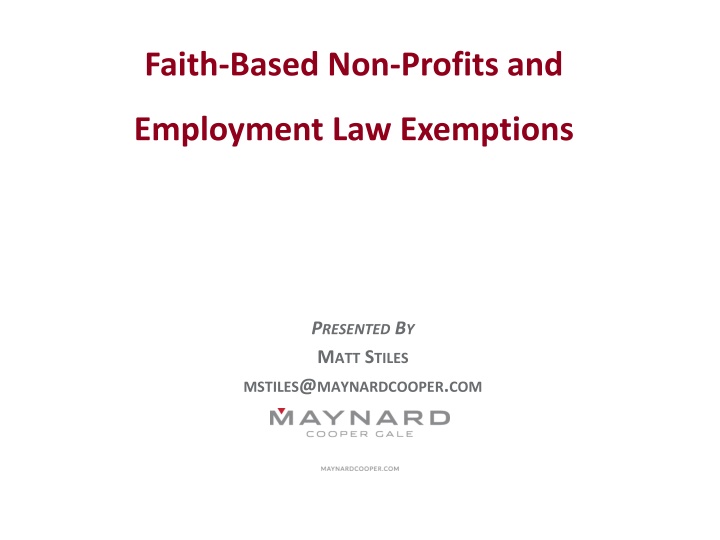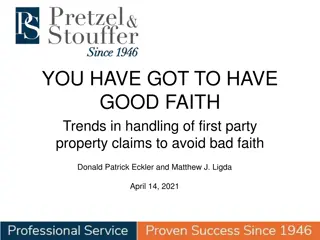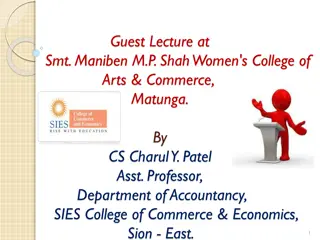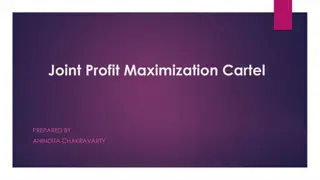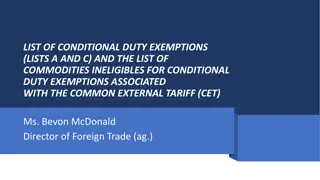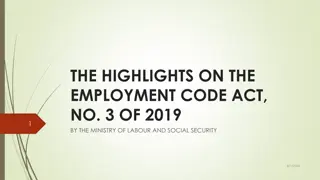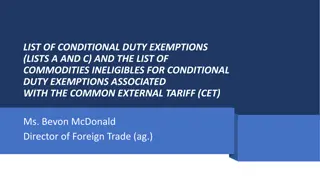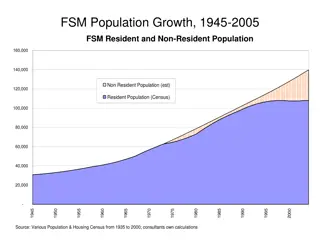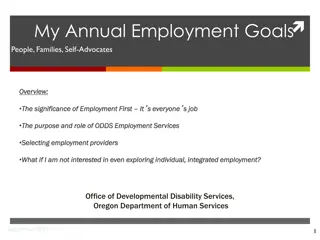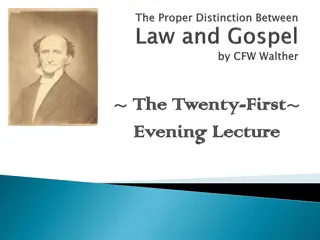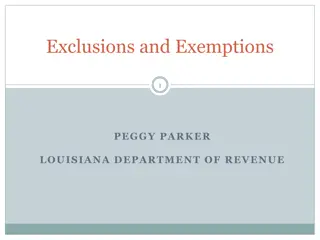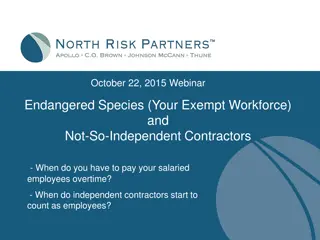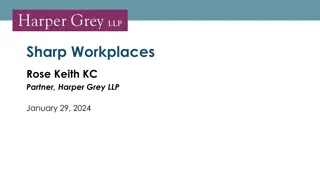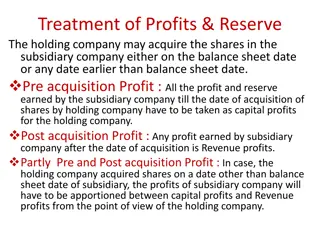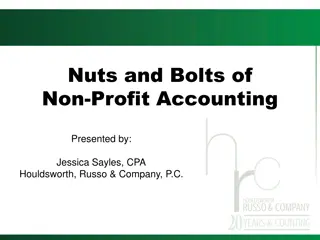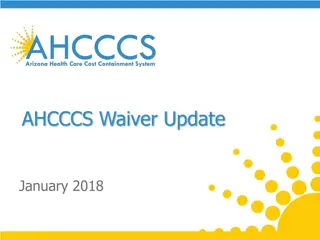Faith-Based Non-Profits & Employment Law Exemptions
Delve into the intricacies of employment law exemptions for faith-based non-profits, exploring Title VII, protected classes, and exemptions for faith-based employers based on religious affiliations and occupational qualifications.
Download Presentation

Please find below an Image/Link to download the presentation.
The content on the website is provided AS IS for your information and personal use only. It may not be sold, licensed, or shared on other websites without obtaining consent from the author.If you encounter any issues during the download, it is possible that the publisher has removed the file from their server.
You are allowed to download the files provided on this website for personal or commercial use, subject to the condition that they are used lawfully. All files are the property of their respective owners.
The content on the website is provided AS IS for your information and personal use only. It may not be sold, licensed, or shared on other websites without obtaining consent from the author.
E N D
Presentation Transcript
Faith-Based Non-Profits and Employment Law Exemptions PRESENTED BY MATT STILES MSTILES@MAYNARDCOOPER.COM
AGENDA Title VII (Federal Anti-discrimination) and Faith-Based Exemptions FLSA and Faith-Based Exemptions
Protected Classes Under Federal Law and in Most States Pregnancy Race ARE ALL RACES PROTECTED? Color Religion Citizenship Genetic Information Marital status Sex Sexual Orientation National Origin Gender Identity Age Disability Military service
Title VII for Faith-Based Employers Special Exemptions for Faith-Based Orgs Where Character of Org is Primarily Religious, not Secular ARE ALL RACES PROTECTED? Bona Fide Occupational Qualifications: Religious Affiliation
Title VII Exemptions Generally Employee Threshold: Title VII only applies to employers with 15 or more employees ARE ALL RACES PROTECTED? No FTE calculation Based on all employees (FT, PT, temporary, etc.)
Title VII Exemptions Generally Bona Fide Occupational Qualifications: employers may consider religion, sex, or national origin bona fide factors in employment decisions if those factors are a bona fide ARE ALL RACES PROTECTED? occupational qualification reasonably necessary to the normal operation of that particular business or enterprise. 42 U.S.C. 2000e- 2(e)(1) Available to any employer, not just faith-based orgs Has been narrowly construed by courts For faith-based orgs, BFOQ is only applicable where religion plays an extremely important part of the work environment and is applicable to the job or jobs at issue
Title VII Rules for Faith Based Orgs General Religious Exception: prohibition against religious discrimination does not apply to a religious corporation, association, educational institution, or society with respect to ARE ALL RACES PROTECTED? the employment of individuals of a particular religion to perform work connected with the carrying on by such [entity] of its activities. 42 U.S.C. 2000e-1(a) religious corporation, association, educational institution, or society is not defined Courts have considered: (1) the purpose/mission of the org; (2) ownership, affiliation, or source of funding for the org; (3) requirements placed on staff and members of the org (including faculty and students, if a school); and (4) the extent of religious practices in, or the religious nature of products and services offered by the organization
Title VII Rules for Faith Based Orgs Religious Educational Institutions: may hire and employ employees of a particular religion if the [entity] is, in whole or in substantial part, owned, supported, controlled, or managed by a ARE ALL RACES PROTECTED? particular religion or by a particular [organization], or if the curriculum of [the institution] is directed toward the propagation of a particular religion. 42 U.S.C. 2000e-2(e)(2) Separate but similar to the General Religious Exception, above Both the General Religious Exception and the Religious Educational Institutions Exception apply only to applicant and employment hiring/firing decisions involving religion, but no exception applies to other prohibited discrimination, or other employment decisions
Constitutional Rights for Faith Based Orgs Constitution s Free Exercise Clause: even before Title VII incorporated specified exceptions for religious orgs, the U.S. Supreme Court recognized that the freedom to select the clergy has federal constitutional protection as part of the free exercise of religion against ARE ALL RACES PROTECTED? state interference. Kedroff v. St. Nicholas Cathedral, 344 U.S. 94, 116 (1952). Court interpretations of this decision have lead to what is known as the ministerial exception As applied by the courts, it allows religious orgs to select clergy without regard to Title VII s prohibitions, but requires that employment decisions made regarding other positions within the organization comply with Title VII s requirements and exceptions. In general, to qualify as clergy, the job duties must include teaching, spreading the faith, church governance, supervision of a religious order, or supervision of participation in a religious ritual and worship Petruska v. Gannon Univ., 462 F.3d 294, 303-04 (3rd Cir. 2006)
BFOQ and Religious Exemption Problems BFOQs rarely apply across all jobs throughout an organization Some jobs inherently have different essential functions that ARE ALL RACES PROTECTED? don t require the same sex, religion, national origin, etc. How we define the essential functions of the job and how those essential functions are necessary to the core mission of the organization will determine whether we can assert the BFOQ
FLSA Exemptions for Faith Based Employers FLSA Coverage Two Tiered: Part One: Enterprise Coverage: As a general matter, non- profit organizations are not covered enterprises under the ARE ALL RACES PROTECTED? FLSA unless they engage in ordinary commercial activities that result in sales made or business done that meet the $500,000 threshold. Looks at gross receipts of sales/business done, and other revenue producing activities Activities that are charitable in nature are not considered ordinary commercial activities and do not establish enterprise coverage
FLSA Exemptions for Faith Based Employers FLSA Coverage Two Tiered: Part Two: Individual Coverage: Even where an organization is not a covered enterprise under FLSA, it may still be obligated to comply with the FLSA for any employee who is ARE ALL RACES PROTECTED? engaged in interstate commerce Ownership of assets/locations must not cross state lines Employee duties/responsibilities remain within one state Moves no goods, persons or things across state lines Do not actively solicit donations from out of state Do not travel outside the state for business purpose Do not accept referrals from out of state DOL will not assert individual coverage of an employee, who on isolated occasions spends an insubstantial amount of time performing [out of state] work
FLSA Exemptions for Faith Based Employers FLSA Ministerial Exemption: DOL s Wage and Hour Division Field Operations Handbook, Section ARE ALL RACES PROTECTED? 10b03(b) embraces the constitutional ministerial exemption when it provides, Persons such as nuns, monks, priests, lay brothers, ministers, deacons, and other members of religious orders who serve pursuant to their religious obligations in the schools, hospitals, and other institutions operated by their church or religious order shall not be considered to be employees for purposes of FLSA See also Dole v. Shenandoah Baptist Church, 899 F.2d 1389 (4th Cir. 1990)
FLSA Exemptions for Faith Based Employers FLSA Houseparent Exemptions: Usually are non-exempt and are not eligible for a white collar exemption (Executive, Administrative, Professional) Section 213(b)(24) Houseparent Exemption is problematic for today s foster homes because (1) the entity claiming the exemption must be a nonprofit ARE ALL RACES PROTECTED? educational institution that is state accredited for education; (2) children must live on campus in group homes; (3) children must be orphans (defined as: both natural parents are deceased); and houseparents must be married and paid at least $10,000 annually Residential Care Facilities: Reasonable Agreement is best practice authorized by 29 C.F.R. 785.23 and July 27, 2004 Opinion Letter (FLSA2004-7) Agreement must be in writing and signed by employer and houseparents Exclude from compensation sleeping periods of not more than 8 hours, bona fide meal periods, and scheduled free time Employee resides on premises for at least 120 hours or 5 consecutive days or nights Employee has private quarters in a homelike environment Similar rules for relief houseparents who work 1 to 3 nights; relief and regular houseparents do not work together for more than 1 hour per day; private quarters for sleeping; compensated for at least 8 hours in each 24 hour period of relief
BEST PRACTICES FOR PRESERVING/ASSERTING YOUR RELIGIOUS EXEMPTIONS
Explaining Your Employment Practices You don t have to explain it: We do not comment on confidential personnel matters. ARE ALL RACES PROTECTED? confidential Hiring decisions are personal, circumstance-specific, and You can take the high road: This organization complies with all applicable federal, state, and local [employment] non-discrimination laws. Using a religious exemption or BFOQ is compliance!!!
Profess Your Mission Is your faith-based mission clearly stated in your articles of incorporation? Does it appear in your by-laws? Is it prominently displayed on your website? Is it page 1 of your Employee Handbook? Is it framed, engraved, or otherwise displayed in your greeting area? Is it contained in your job descriptions? Is it the subject of performance appraisals?
Embrace/Preserve Your FLSA Immunity NOT Commercial Activities Soliciting and receiving donations, even over $500,000, is not a commercial activity Providing food, clothing, shelter, love, counseling, ministry, recreation, compassion, are not commercial activities, even where $ is spent to do so Preaching the gospel, witnessing, proselytizing, are not commercial activities
Embrace/Preserve Your FLSA Immunity Commercial Activities Selling goods or services in excess of $500k (gross, annually) for which revenue is received and competitors providing comparable goods or services are doing so for profit Thrift shops Agricultural operations Fundraising sales (wrapping paper, candy bars, cookies, etc.) Light manufacturing or work programs
Embrace/Preserve Your FLSA Immunity Commercial Activities If you have commercial activities, consider separating them from the non-profit corporation Separate Tax ID Separate Executive Director Separate Board Members Non-profit might still hold the assets (the store, the land, the vehicles) and lease those to the separate org at nominal rates on the condition of receiving donations
Other Sources of Anti-Discrimination Rules for Faith-Based Org Considerations ARE ALL RACES PROTECTED? Grants Insurance contracts State and federal contracts
PRESENTED BY MATT STILES MSTILES@MAYNARDCOOPER.COM
